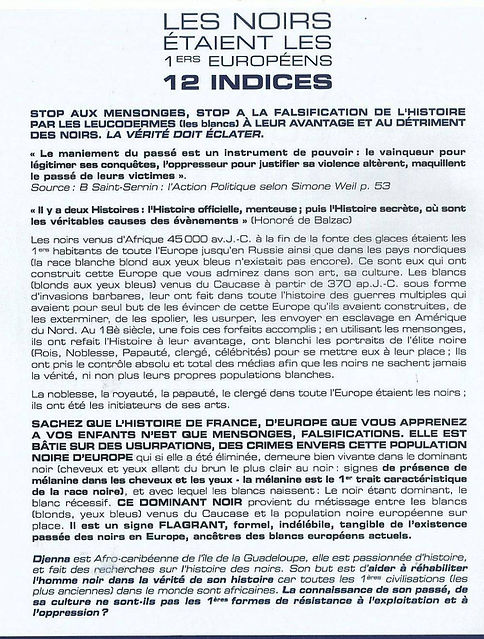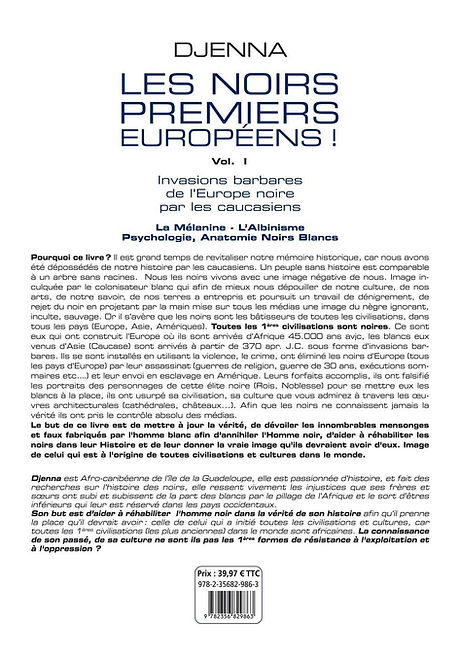EMPEREUR CHARLES V 1500/1558 Héritier des Habsbourg et de la maison de Bourgogne, Héritier de 17 couronnes


BEING BLACK, MELANIN THIS DIVINE BLESSING
www.la-melanine-une-benediction.com
SITE UNDER RENOVATION
info@la-melanine-une-benediction.com In Englishwww.melanin-a-blessing.com
ATTENTIONWE ARE ATTEMPTING TO BLOCK THIS SITE BY CALLING IT DANGEROUS. DISREGARD ANY WARNINGS, THIS SITE IS SAFE AND WELL PROTECTED with Kaspersky (the most reputable anti-virus). They do everything to prevent us from having access to our knowledge.STRONGLY RECOMMEND THIS SITE TO YOUR FRIENDS
The purpose of this site is to bring black people to self-awareness, to realize that with Africa cradle of humanity,(Africa)they are at the origin of all inventions: inventions -in all fields ofknowledge, as far back as one can trace- monopolized, copied and improved by the leucodermas who usurped them and declared themselves their inventors. Since High Antiquity, blacks have been the inventors of culture: arts, sciences, maths, philosophy, music, religion, engineering, medicine, surgery, astronomy, navigation etc... before whites stripped them of them and falsified them at their advantage. All science is related to Egypt which was a country populated by blacks.It is thanks to this black pigment present in abundance in their brain: neuromelanin,that black had and has this high capacity for creation, invention at all levels.
This site reveals the horrors and monstrosities put in place by the whites in order to degrade and reduce the blacks to the lowest level to justify their stripping, because the deficiency of the whites in this neuromelanin pigment did not allow them to equal the blacks. But neverthelessfor blacks, the purpose of this site is to be informed about them and their opponents: whites in order to be able get up and react, feel proud of themselves, grateful for their neuromelaninand their melanin, no longer allowing themselves to be reduced, degrading but having a win-win relationship in their relations with white people, no longer having this win-lose relationship which has always prevailed and continues to prevail ; the eternal winning the white, the eternal losing the black.Fueling resentment and anger towards them puts us in a losing position and has harmful effects on our health. We blacks must be diplomatic and lucidly seek our true interests in win-win relationships with leucodermas without bringing out resentment.
Isn't knowledge of one's past, of one's culture the first forms of resistance to exploitation and oppression?
Watch out, the wheel is turning, the West is in decline, the world is heading towards multipolarity. I'Africacontinent holding all the wealth of the planet, continent that does not know natural disasters,has its major role to play.Besides that our economic relations must be win-win with all our partners including Russia, China; before signing any partnership with any Western country (especially France), we must demand from them a written and signed commitment to reparations for all crimes (blood, looting, etc.) committed against us , because they have the blood of millions of Africans on their hands. We must also set up our own International Criminal Court to try all those Western criminals who abused us without mercy.We will be globally respected the day we command and inspire respect.
Dear visitors,see for yourself! : my videos are often deactivated, although very active on you tube, my visit counter had been removed (I put it back), as well as certain images. Would revealed truths bother?Recommend this site to those around you




Read the book ''Les Noirs 1ers Européens''
Sold by theTamery bookstorein Paris. General Library Guadeloupe The true history of blacks in Europe. 5th edition
" The manipulation of the past is an instrument of power: the winner to legitimize his conquests, the oppressor to justify his violence alter, disguise the past of their victims. Source: B Saint-Sernin: Political Action according to SimobornWeil pp53
-There are two Histories: the official, lying history that is taught; then the secret history, where are the true causes of the events: a shameful history "(Honoré de Balzac, writer)
We Blacks MUST KNOW that we have been victims since the 18th century by the leucodermas (the whites) of the most vast and monstrous impersonation of our kings, queens and famous people of Europe, that history has ever known. We are also victims of the greatest and diabolical falsification of history ever carried out. The leucodermas have done this diabolical work of make-up and crime with the help of their globally present secret societies.
Isn't knowledge of one's past, of one's culture the first forms of resistance to exploitation and oppression?
Independence of Haiti- The ransom extorted by France - The battle of Vertières
Independence of Haiti- The ransom extorted by France - The battle of Vertières

The Caribbean island is not in debt, it is a creditor. France owes him money. Explanations by Jérôme Duval, from the CADTM. (politis.fr)
The misery of the colonized countries has largely increased due to a transfer of debt: the debts contracted by the colonial powers with the World Bank to make the most of their exploitations in their colonies were then transferred without their consent to the colonized countries. who gained their independence. They constitute a case of odious debt, just like the subsequent debts contracted to repay them.
The Haitian Revolution (from 1791 to 1802) was led by a man who played a leading historical role: Toussaint Louverture became one of the great figures of the movements for the emancipation of the colonies from their metropolis. Arrested by the French general Leclerc on June 7, 1802, on the orders of Bonaparte, he was taken to France, Toussaint Louverture ended his days in 1803, imprisoned in solitary confinement without trial at Fort de Joux, in the harsh climate of the Doubs (North East of France), without having been able to know the proclamation of independence of Haiti on January 1, 1804 by his lieutenant, Jean-Jacques Dessalines.
In Santo Domingo, on the night of August 22 to 23, 1791, tens of thousands of slaves entered an armed insurrection simultaneously, spurring a long process that led to the first abolition of slavery in all of history, on August 29 August 1793, and the proclamation of independence. Saint-Domingue, then recovering the name of Haiti, became the first independent black republic in 1804, a unique case in the history of a slave revolt which gave birth to a state. France probably never forgave this insurrection, resulting in the loss of income from its slave system and thousands of sugar and coffee plantations destroyed. Haiti pays very dearly: in 1825, the country is forced to pay France 150 million gold francs (i.e. the annual budget of France at the time) intended to "compensate" the former colonists masters of slaves for loss of "property", in exchange for recognition of its existence as a nation-state. The ransom is imposed under the threat of military invasion: on April 17, 1825, a fleet of 14 warships was massed in the harbor of Port-au-Prince, ready to intervene, suggesting a possible restoration of slavery in case of insubordination.
This ransom extorted from the Haitian people for having “dared” to gain independence, was renegotiated thirteen years later, in 1838, at 90 million following an agreement scandalously named “Treaty of Friendship”. Bringing down generations under the weight of an illegitimate debt, Haiti, which struggled for many years to emancipate itself from French tutelage and free itself from slavery, will pay, from 1825 to 1883, down to the last penny, the ransom to its former settlers. For Louis-Georges Tin, President of the Representative Council of Black Associations (Cran), “the money must go back to the Haitian state and Haitian civil society. The time has come to repair this double punishment suffered by the island, slavery then ransom. The destitution of Haiti is due to the payment of these 90 million gold francs which forced the country to go into debt for decades”.
This considerable sum forced Haiti into debt until 1946, and the country was permanently drawn into the infernal spiral of over-indebtedness, impoverishment and instability. The payment of interest on the debt contracted to pay the indemnity only ceased in 1952.
In April 2003, on the occasion of the bicentenary of the death of Toussaint Louverture, President Jean-Bertrand Aristide affirms that it is France which has a debt towards Haiti and not the reverse. He demanded "restitution and reparation" for the damage committed by slavery and for the ransom demanded in 1825. He demanded 21 billion dollars from France, ie the capitalized value of the 90 million gold francs paid as tribute. But after the Franco-American political and military intervention that led to the overthrow of Aristide in February 2004, the various regimes that will succeed one another at the head of the Haitian state will abandon the claim for restitution.
It will be necessary to wait for the earthquake of January 12, 2010, causing at least 250,000 deathsand nearly 1.3 million homeless, for a French president to decide to set foot on the territory of his former colony for the first time since the island's independence in 1804. Nicolas Sarkozy finally makes a whirlwind visit barely four hours on February 17, 2010. And to announce some 326 million euros in aid. However, of this sum, 56 million will not be mobilized since it is an account cancellation with the Paris Club of the bilateral debt that the island has contracted vis-à-vis France.
The visit of President François Hollande on May 12, 2015 was welcomed by demonstrators demanding "reparation" and "restitution" by France of the sum paid by Haiti for its independence. Hollande if he spoke of moral debt has always refused to return the billions that Haiti has paid to France. This moral debt, Haiti has never asked for compensation. It is irreparable, we agree. ... France also has a financial debt vis-à-vis Haiti. This debt is unique in history. This is the only time the victors have paid tribute to the vanquished”. And it is of this ransom paid throughout the 19th century that we must speak, since it hampered the Haitian economy, strangled its development and still mortgaged its future.
According to restorative justice theory, it is not enough to acknowledge the harm done, which Hollande did in 2015; we must also return the stolen property and compensate the victim for the harm caused, which the Haitian people are demanding from France today.
In 1988, the United States offered reparations to Japanese-Americans treated unworthily during the Second World War and in 2011 it offered them to Native Americans whose ancestral land was poorly managed by the American government (Hétu, 2019). The Germans, in the 1952 Israeli-German Reparations Treaty, offered reparations to the Jews for their treatment of them (Giniewski, 1954). Why can't the descendants of black slaves benefit from the same treatment?
The French benefit to this day from the advantages provided by the slavery system in general and from the payment of the debt of independence of Haiti in particular. Their current prosperity is the direct result of these past injustices. They have a collective responsibility to right those wrongs (Dryzek, J., et al., 2008; Thompson, 2018; Hetu, 2019). Moreover, France as an institution endures over time. If the people, emissaries of the institution, who perpetrated these crimes are no longer of this world, the institution is still present; let her pay for what she has unjustly acquired. Thus, “Being linked to considerable issues of economic justice, reparation could not be dismissed out of hand” (Tin, 2013; p. 20). Moreover, paying off this debt will in no way harm the current well-being of the French people, while it will make a big difference in the lives of Haitians. It is a small sacrifice that will contribute to the good of a very large number.
The money that would have been used to develop the country was extirpated to compensate for a defeated army (the French); never seen in the history of war, that the victor had to pay tribute to the vanquished (Duval, 2017). Should the reason of the strongest always be the best and condone even the unacceptable?

Passage of French President Hollande in Haiti in 2010

Haiti: Misery
Victory of Haiti over France against the reestablishment of slavery: The Battle of Vertières November 18, 1803-1st defeat of the Napoleonic epic
The Battle of Vertières is the first defeat suffered by the armies of Napoleon Bonaparte throughout the history of the Napoleonic epic. It is linked to the slavery past of France.
This battle until today is deliberately hidden from the history of France because of its causes and the circumstances of its unfolding, because it saw slaves opposing the reestablishment of slavery in Haiti and gaining their freedom. defeating the strongest army in Europe.
At that time, the history of Haiti is closely linked to that of Guadeloupe. Because, it was on learning of the defeat of the Guadeloupe troops in May 1802, and the reestablishment of slavery by Richepance and his troops, that General Dessalines took the lead of the Haitian troops to lead them to the decisive victory of the 19 November1803.
The Battle of Vertières took place in Vertières near Cap-Français (today Cap Haïtien) in the North of Haiti, on November 18, 1803. It marked the capitulation of the French troops of Napoleon Bonaparte before the Haitian troops commanded by Haitian General Jean-Jacques Dessalines. It opposes the troops commanded by General de Rochambeau (sent by Napoleon) to those of Dessalines. This was the last battle of the Santo Domingo expedition. Haiti became the first black state of modern times.
The resistance of the troops led by Dessalines and of the 9th Brigade, commanded by François Capois, who led them to final victory, forced Rochambeau to capitulate.
Historical
In 1794, in France the revolutionary government abolished slavery. His decision put an end to the revolt of the slaves of Santo Domingo, triggered in February 1791 and led by Toussaint Louverture. After rallying to power, their leader Toussaint Louverture was appointed general and succeeded in driving out the English troops who had landed at the call of the white settlers.
Then, he begins to govern the reunified island, independently from France. This greatly displeases the First Consul Bonaparte, who came to power in 1799 and was anxious to restore France's positions in Europe and in the world. He therefore sent expeditionary forces to restore the authority of Paris in Saint-Domingue and Guadeloupe.
The French defeat and the birth of a nation
36 ships and 23,000 soldiers landed in Santo Domingo at the beginning of 1802 under the orders of General Charles Leclerc. Their arrival provokes an uprising of former slaves, led by Toussaint Louverture.
The French set a trap for him: they make him come on the pretext of wanting to discuss with him, then capture him unfairly. At the moment of boarding the ship, Toussaint Louverture utters these famous words: "By knocking me down, they only felled in Santo Domingo the trunk of the tree of freedom, but it will grow back because its roots are deep and many”. Deported to France by order of Bonaparte, he was interned - without trial - at Fort de Joux in the Jura. He died there of the rigors of the climate on April 7, 1803. His deputy Jacques Dessalines succeeded him. He rallied to the French to better eliminate his rivals, before turning against them.
Shortly before, on November 2, 1802, Charles Leclerc, commander of the French soldiers, had himself died of yellow fever... like many of his soldiers. Time is playing for Dessalines. The reinforcements brought by General Rochambeau, 10,000 men, did not allow the situation of the French to be restored. Extremely weakened, they finally capitulated on November 18, 1803, at Fort Vertières.
Of the two expeditionary forces, there are hardly more than 2,000 men left. Following the victory of the insurgents, the French garrisons surrendered one after the other, allowing the former colony to proclaim its independence on January 1, 1804. It then took the name of Haiti as its first inhabitants the Amerindians had given him.
In total, the First Consul will have sent nearly 70,000 men with the sole aim of restoring the slave system in Santo Domingo. 55,000 of them lost their lives there, victims of former slaves or fevers.A human fiasco at least as important as that of the Egyptian expedition. Nevertheless, the reputation of the First Consul on the European continent will not have to suffer (and the French themselves will hasten to forget this inglorious episode)

Toussaint Louverture- Independence of Haiti

Battle of Vertière - Independence of Haiti
France amnesiac on this Haitian victory
But the battle of Vertières and the ensuing independence of Haiti will be forgotten by France and the French.
In fact, it is an episode that we must hasten to erase from all memories, an episode which leads the former slaves of Saint-Domingue to proclaim the independence of the colony and which is also the only example of an abolition of slavery obtained directly by former slaves.
It is understandable that, under these conditions, the loss of Santo Domingo is a repressed national shock. An oversight that overlooks the fact that Napoleon sent no less than 70,000 men for the sole purpose of restoring the slave system in Santo Domingo. 55,000 of them lost their lives there, victims of former slaves or fevers. The event will not enter the history books of France.
Valmy, Austerlitz, Ulm, Waterloo… so many battles of Napoleon Bonaparte whose names are familiar to us. But who, outside of Haiti, has ever heard of the Battle of Vertières, the spectacular and bloody culmination of the Haitian War of Independence? Who knows that this confrontation resulted, on November 18, 1803, in one of Napoleon's worst defeats? Who knows that the Blacks claimed the ideals of the Revolution there? Those who know this story are few, because defeated France worked to erase the traces of its discomfiture as soon as the battle was over. For 216 years, Vertières has been in turn concealed, barely mentioned or even badly dated, not to mention the still prevailing argument according to which the soldiers of the native army could not have triumphed had it not been for fatigue and discouragement of French soldiers and military aid from the British enemy allied to Jean-Jacques Dessalines. However, Vertières should have been a landmark: its outcome, disastrous for the French colonial power, was to irremediably crack the foundations of slavery and colonialism. Vertières consecrated the victory of the right to life (and therefore to Afro-descendants), to citizenship and to freedom. Napoleon's first defeat was neither Baïlen in Spain nor Moscow, but Vertières in Haiti, November 18, 1803
The French troops were so well established in Fort Vertières, located two kilometers from Cap-Haitien, that they thought no one could dislodge them. With a clever device of cavalry, artillery, and above all grenadiers who despised death, the native forces (20,000 against 5,000 French), demonstrated an astonishing superiority to defeat the largest army in Europe: bravery, courage, intrepidity, capacity for organization, strategy and tactics, self-sacrifice, generosity, etc. The will to win was at its highest point, even if the price to be paid in human lives was very high.
The causes of deforestation in Haiti
It is primarily to the French Empire that we owe a significant part of the suppression of the virgin forest in the 17th and 18th centuries, destroyed to make way for sugar cane plantations. Deforestation is also the consequence of the trade in mahogany and other precious woods, used in particular to repay the debt imposed on Haiti by France following its independence. Another cause is the use of charcoal: charcoal is the fuel most used for cooking, for a population of more than 10 million people. . It should be noted that the share of deforestation involved in the use of charcoal is closer to pruning than to the cutting of trees; it increased the deep misery in which the Haitians found themselves in order to pay the ransom imposed by France.

